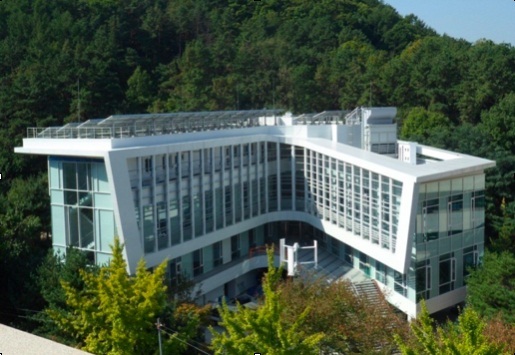YONGIN, Gyeonggi Province ― Electrical appliances and lights switch on and off, while the balcony doors slide open, all by themselves in an empty house.
This is not science fiction, but reality at Hyundai Engineering & Construction’s Green Smart Innovation Center in Yongin, Gyeonggi Province.
However, rather than user convenience, the technologies behind such features were developed as part of the company’s plans to cut fossil use in housing, buildings and public infrastructure.
Hyundai E&C, the country’s largest builder, is hoping to develop advanced green technologies to gain an edge over its rivals.
This is not science fiction, but reality at Hyundai Engineering & Construction’s Green Smart Innovation Center in Yongin, Gyeonggi Province.
However, rather than user convenience, the technologies behind such features were developed as part of the company’s plans to cut fossil use in housing, buildings and public infrastructure.
Hyundai E&C, the country’s largest builder, is hoping to develop advanced green technologies to gain an edge over its rivals.

“(The company) has selected the four areas of energy, resource and water shortage, pollution and urbanization as future businesses, and is focusing on developing new technologies,” said Lee Hong-seok, chief of Hyundai E&C’s research.
As part of the efforts, it has installed an 85-square-meter apartment fitted with an array of energy-saving features within the Green Smart Innovation Center.
In the installation, everything from electrical appliances to windows are automatically controlled, and even humidifiers and heaters are in place to simulate a situation where the place is occupied by five people.
Inside the mock-property, everything is controlled by the energy and environment management system known as TEEMS that was developed in-house.
In addition to the high-tech features, the building is fitted with thicker insulation and other energy-efficient materials that together cut energy consumption by about 30 percent compared to conventional buildings of similar size.
The company also estimates that electronic and electrical devices can be used to cut energy consumption by a further 30 percent, which would enable it to create “zero-energy” buildings.
It plans to apply related technologies to its premium apartment brand “Hill State” by 2025.
However, the company needs to resolve some remaining issues for such technologies to be applied fully.
“If (the technologies) are applied to real buildings, there will be problems in hiring (system) managers, but I think that it can be realized in the near future,” said Chung Hong-gu, chief of green city research team.
By Suk Gee-hyun (monicasuk@heraldcorp.com)





![[Herald Interview] 'Amid aging population, Korea to invite more young professionals from overseas'](http://res.heraldm.com/phpwas/restmb_idxmake.php?idx=644&simg=/content/image/2024/04/24/20240424050844_0.jpg&u=20240424200058)











![[KH Explains] Korean shipbuilding stocks rally: Real growth or bubble?](http://res.heraldm.com/phpwas/restmb_idxmake.php?idx=652&simg=/content/image/2024/04/25/20240425050656_0.jpg&u=)

